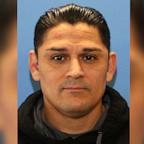Baghdad Family Struggles with Backdrop of Danger
Jan. 30, 2005 -- -- Hiding behind a car's tinted back windows, Scott Peterson of The Christian Science Monitor has been paying secret visits for two years to Karima Selman Methboub and her eight children.
"Careful, you're not hidden," Peterson told a cameraman in the front seat who has tagged along with him. Every western reporter in Baghdad worries about kidnappings. "You have to pick your battles," he said.
Peterson is trying to tell the Iraqi story through the eyes of one family. The Methboubs live in a middle-class neighborhood of Baghdad, but Peterson says they are very poor. Karima's husband died in a car crash in 1996. Karima baked bread for the neighbors to support her children. But that stopped after U.S. troops arrived and the price of propane to run her stove skyrocketed. Now she cleans rooms at a hotel, for $60 a month.
Peterson's car pulled up, and in a few seconds he disappeared into the stairwell of the Methboubs' apartment building.
"No light as usual," he muttered as he felt his way up the stairs with a flashlight. No water either; it's been out for the last five days. Most Americans have little idea what daily life has been like in Iraq since Saddam fell, Peterson says. It may have meant the hope of freedom, but for the Methboub family, the immediate issues of food, money and sanitation loomed larger.
"Speaking to them allows us to get much deeper behind a headline that normally just shows how many people were killed in the latest car bomb," said Peterson. "There are really also 25 million typical Iraqis who get by day to day, and how they do that is kind of a miracle in its own right."
"Hello! Salamalee!" said Peterson as he greeted Karima Methboub. "It is so good to see you!"
They sat in the darkened apartment, with the Methboub children and a translator, talking. He asked Karima's twin girls for whom they would vote if they were old enough. "Saddam, Saddam," came the answer.
"You would vote for Saddam if he were on the ballot?" asked Peterson. The teenagers nodded.
In fact, despite the hardships of life in Saddam Hussein's Iraq, the Methboub family was loyal to him, and kept a portrait of him long after he had been overthrown.
"I think for many Iraqis the regime was something they grew accustomed to over all those decades -- that was the devil they knew," Peterson told us later. "There was fear under Saddam Hussein, of course, but it was kind of a political fear, that is unlike the very visceral fear of being killed in a mortar blast, or being shot at today."
Peterson first wrote about the Methboubs in late 2002, as they worried about the coalition forces massing around their country. When American bombs began falling on Baghdad in 2003, the family slept on the floor. Later, Karima Methboub sold some of her furniture to pay the children's quarterly school fees of about $20 per person, but had to pull one daughter out of school to help take care of the younger kids.
"I don't think this is a happy family, except for the happiness they draw from themselves," said Peterson. "One of the most pleasurable stories that I have written in the past year was a few months ago when Zainab, the oldest daughter, was engaged.
"There was this huge party, and it was incredible, the abandon to which this family threw themselves.
"There had been a killing of many, many children in a car bomb, there were mortar attacks, and this family was just able to shut off all of that for a moment and continue on with life as they wanted it to be lived."
With Saddam gone, Karima Methboub said things had become so bad, so chaotic, so frightening, that she was determined to get to the polls. Any change, she says, would be for the better.
"There have been so many bombs in Baghdad," said Peterson. "Will you go vote even it there are bombs in your neighborhood?"
"Yes," she said through the translator. "I am going to take the children with me. If we die, we die."
The Methboubs have no telephone, so today Peterson asked his translator to make the dangerous trip to their apartment to see if they had participated in the election. He came back triumphant.
Karima Methboub had gone to the polls despite all the threats of violence. She had cast her ballot, and then hurried home. The translator took a picture of her holding up her thumb, stained with ink to prove she had voted.




